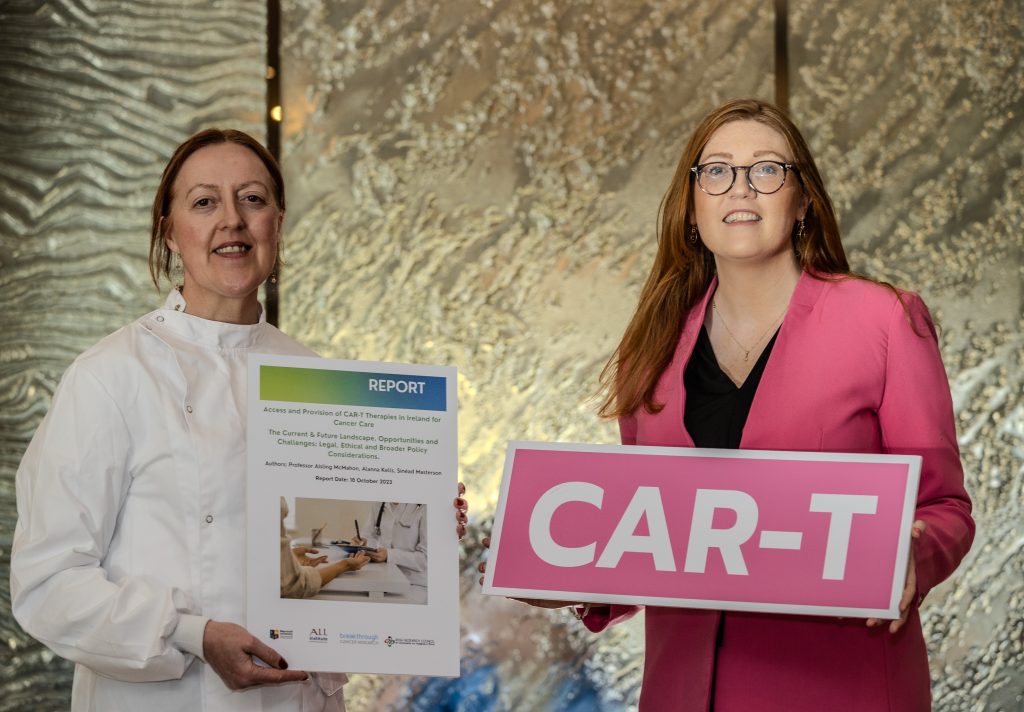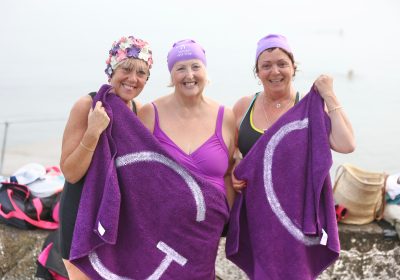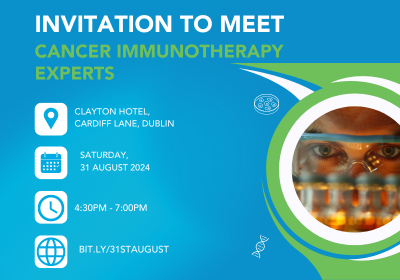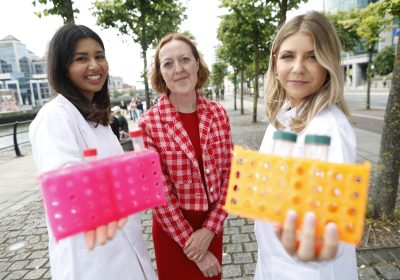Researchers and Breakthrough Cancer Research are calling on government and NCCP to develop a national strategy to achieve more sustainable and affordable pathways to increase the availability of life-saving advanced treatments like CAR-T therapies, a new frontier in cancer therapies, for patients across Ireland.

An advanced immunotherapy for cancer treatment called CAR-T therapy, which uses modified cells from a person’s own body to fight cancer, has the potential to prove life-saving for some patients diagnosed with certain types of blood cancers, such as lymphoma, leukaemia and myeloma. Emerging research also suggests that such therapies could have the potential to treat other types of cancers in future including some solid tumours, therefore, they will likely present considerable promise to be used to save the lives of many more people diagnosed with cancer in future.
However, a new report ‘Access and Provision of CAR-T Therapies in Ireland’ has revealed that under the Irish health system, it is likely to be too expensive to provide these therapies at a significant scale under the current commercial routes through which they are available. The current health and manufacturing systems are also likely not adequately equipped, resourced or structured currently to develop or deliver CAR-T or other cancer immunotherapies – alongside existing health services – at the larger scale that could potentially benefit patients in the future here.
The report, which was developed by a team of researchers in Maynooth University in collaboration with Breakthrough Cancer Research, calls on the Government and the National Cancer Control Programme (NCCP) to urgently consider and develop a national strategy for Ireland around the provision of cellular therapies, including CAR-T therapies. It is vital that such a strategy would consider how to achieve more sustainable mechanisms to develop, and deliver new and available treatments to patients, at a cost that is more affordable to the national public health system. The report outlines ten policy recommendations which seek to recognise and address patients’ current needs and sets out key components that need to be considered under such a national strategy.
Lead researcher of the report, Professor Aisling McMahon, School of Law and Criminology, Maynooth University, said: ‘CAR-T therapies have significant potential for the treatment of certain types of blood cancers currently. In some cases, they have been lifesaving, leading to cancer going into remission for patients who were previously terminally ill. However, at a health systems level, there are significant challenges around providing such therapies currently, including the very high costs of these therapies under current commercial pathways. A national strategy is required to consider these challenges, and to achieve more sustainable and affordable pathways to develop and provide access to CAR-T therapies in Ireland for patients who may benefit from them where they are clinically indicated.’
What is CAR-T?
According to Orla Dolan, CEO of Breakthrough Cancer Research, ‘In simple terms, CAR-T therapy takes cells out of the body, genetically modifies them, and puts them back in to treat the cancer, which is one of the reasons why it’s so expensive. However, this is the beginning of a new frontier in cancer research. The treatment is available in Ireland at a small scale currently. It’s fantastic and life changing but needs to be a bigger revolution. We need it to be delivered at national level to everyone that can benefit. We need cutting-edge facilities, expertise and funding. We have to be ready for the future now and get the framework in place as this is the first of many exciting new treatments on the way. We can’t have structural issues in our system where people can’t get access to life-saving solutions. Conversations need to be had and changes have to be made at national level.’
CAR-T therapy is a type of cancer immunotherapy which aims to use cells from a patient’s own immune system as part of the therapy. Immune cells called T-cells are removed from the patient’s body, and modified externally so that they can target and kill cancer cells more effectively. The modified T-cells are then reinfused, or put back into the patient’s body to treat the cancer. Where the treatment is successful, in some cases, it has led to cancer going into remission – where such patients were previously terminally ill with no other clinically indicated treatment options. While there are side effects associated with CAR-T therapies, including some which can prove fatal, clinical teams are developing strategies to reduce these risks, and to optimise the management of such side effects.
Currently, a number of types of CAR-T therapies are approved at a European level for the treatment of certain (blood) cancers such as lymphoma, leukaemia and myeloma, in certain contexts. However, research in the field suggests CAR-T therapies may have potential to treat other types of cancers, and other conditions in the future. Accordingly, the numbers of patients who may benefit from such therapies may significantly increase over time.
In December 2021, St James Hospital carried out the first adult CAR-T therapy in Ireland and to date, 46 adult patients have undergone CAR-T cell therapy here. CAR-T cell therapy is available for specific types of blood cancers for patients who have failed multiple lines of therapy. The provision of CAR-T services for paediatric patients commenced in Ireland in 2022 at Children’s Health Ireland, Crumlin. This therapy has been transformative for many of these patients. Prior to this, patients for whom such therapies were clinically indicated needed to travel abroad to access CAR-T therapies.
However, there are remaining challenges for patients in accessing CAR-T therapies in Ireland as not all therapies approved by the European Medicines Agency are available in Ireland. Importantly, there are significant challenges around providing CAR-T therapies within national public health systems, including the high costs of such therapies when provided under commercial pathways.
The report says that it is vital that a national strategy is developed around the provision of CAR-T therapies in Ireland which considers the current landscape and the pathways that can be used to provide such therapies in a more affordable manner in the future, so that increased access to these therapies based on patients’ clinical needs can be delivered.
The report ‘Access and Provision of CAR-T Therapies in Ireland for Cancer Care: The Current & Future Landscape, Opportunities and Challenges: Legal, Ethical and Broader Policy Considerations’ was written by a team of researchers from Maynooth University, led by Professor Aisling McMahon (School of Law and Criminology, Maynooth University) and joined by Alanna Kells and Sinéad Masterson. This research was conducted as part of the Irish Research Council funded, ‘Patients’ Access to Advanced Cancer Therapies: Ethics and Equity of Access’ (PAACT) project (Professor Aisling McMahon, Principal Investigator) and was conducted in collaboration with Dr. Frances Drummond, Breakthrough Cancer Research.
The study looked at the current landscape for access to such therapies in Ireland, and the issues impacting the availability of advanced cancer immunotherapies, in this case CAR-T therapies, for cancer patients in Ireland. It outlines ten main policy recommendations, and the report including these recommendations have been sent to the Department of Health and the NCCP.
Dr. Frances Drummond, Research Manager, Breakthrough Cancer Research said: ‘Research is leading to new cancer treatments, like CAR-T, which for some patients, who have no other treatment options left, is transformative and in some cases life-saving. We need to understand the barriers to getting new and improved cancer treatments to patients so that we can then all work together to remove these barriers, including the high cost of these treatments and improve access to life saving treatments for those with the poorest prognosis cancer diagnoses.’

Pat Byrne, from Moate, Co. Westmeath, one of the first people to receive CAR-T treatment in Ireland, said: ‘Receiving the CAR-T therapy was the best 11 minutes of my life. The treatments I was receiving previously had stopped working. I feel very fortunate to have received CAR-T treatment. While I did experience some side effects, I was well prepared for these by my amazing team in St. James. My recovery has been steady. I am now in remission, and I am particularly delighted that there is no requirement for any other medications. I am also delighted that since having CAR-T therapies I have been able to travel abroad to see my family. I would like to see this treatment being available to all who need it. I am aware there is amazing research ongoing in the field. As CAR-T therapy continues to develop and perhaps in the future this could be a first line treatment.’
Professor Owen Smith, (Professor of Child, Adolescent & Young Adult Oncology, Trinity College Dublin; Professor of Haematology, Trinity College Dublin; Visiting Full Professor, University College Dublin; NCCP National Clinical Lead for Children, Adolescent and Young Adult Cancers; and Consultant Paediatric Haematologist, Children’s Health Ireland) said : ‘The development of CAR T-cell therapy over the last decade for children and adolescents with blood cancers, especially relapse / refractory B-cell precursor acute lymphoblastic leukaemia (commonest cancer in the 0 – 20 year olds) has been spectacular. Since May 2019, nine children from the National Children’s Cancer Service at Children’s Health Ireland, Crumlin have been treated with CAR-T and all are alive as I write. Over the next 5 years we will witness the rapid development of other CAR-T cell therapies and adoptive cellular therapies for high risk acute myeloid leukaemia, relapse/refractory T-cell acute lymphoblastic leukaemia / lymphoblastic lymphoma and solid tumours. Presently, the single biggest toxicity using these therapies is their financial cost. To bring the cost down and allow ease of access for children and adolescents with cancer into the future we need tighter partnerships between academia and industry involving consensus that will align strategic, scientific, regulatory and funding requirements from the get-go.’
Professor Larry Bacon who leads the adult CAR-T therapy programme in St James’s hospital, Ireland said: ‘CAR-T therapy is the most advanced immunotherapy currently commercially available for patients with high grade B cell lymphoma and B cell acute lymphoblastic leukaemia. It is a very effective therapy in this group of patients who had previously failed multiple lines of therapy and therefore were unlikely to survive in the long term. CAR-T cell therapy now offers these patients a potential curative option. CAR-T therapy is a very specialised therapy that requires significant multidisciplinary input to ensure a safe and effective service delivery. It is an expensive therapy as the costs incurred are not solely the cost of the CAR-T product but significant infrastructural costs including; additional high dependency beds, specialist medical and nursing staff, pharmacy and laboratory resources.
CAR-T cell therapy is still in its infancy and is expected to grow exponentially and include other disease indications in the next decade. The financial burden to the health system is the greatest barrier to ensuring universal availability of these therapies in the future as the number of therapies and indications expand.’
Donate Now
More News
-

One in Seven Women in Ireland Avoid GP Visits Due…
20th SepToday is World GO Day or World Gynaecologic Oncology Day where patients and…
Read More -

Meet the Cancer Immunotherapy Experts
31st AugCould Your Immune System Help Treat Cancer? Hear from world and local experts…
Read More -

Seven Students Awarded Scholarships to Advance Cancer Research in Ireland
22nd JulThis summer, seven promising third-level students will embark on a significant journey to…
Read More









 Contact
Contact